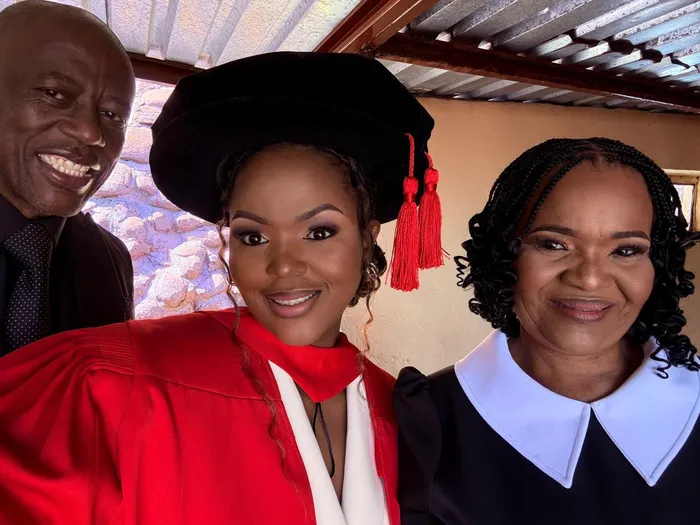
Dr Nonjabulo Ndaba celebrating her the historic academic milestone with her parents Siphiwe Ndaba and Musa Ndaba
Image: Supplied
In a remarkable achievement for academic excellence and representation, Dr Nonjabulo Ndaba has made history as the youngest PhD graduate and the first Black South African woman to obtain her doctorate in the Discipline of Occupational Therapy (OT) from the University of KwaZulu-Natal.
The 33-year-old celebrated the historic academic milestone of being awarded her doctorate from the University of KwaZulu-Natal for her thesis titled: ‘Adapting Occupational Therapy Education in Response to Disasters: A South African Higher Education Perspective During COVID-19’.
Ndaba, a lecturer at UKZN's School of Health Sciences, her study examined how Covid-19 transformed occupational therapy education in South Africa, by exploring experiences of educators and students during the unprecedented disruption.
The study culminated in two comprehensive frameworks for disaster management and educational support, providing evidence-based strategies for future preparedness.
The findings advocate for sustainable, blended learning models that enhance flexibility, accessibility, and student autonomy while maintaining professional standards and promoting equitable educational practices in diverse learning environments.
“This accomplishment represents a significant milestone in my journey as a young academic. I stand on the shoulders of those who walked this path before me, and I am committed to inspiring and mentoring the next generation of scholars.
"I still cannot believe that I'm finally done with my PhD. We are a generation who have doors open for us and opportunities, so there will be more young people like me achieving," she said.
Ndaba said when she started OT was not popular amongst African people.
She completed her Bachelor of Science in OT at the University of Cape Town, then her master's in Public Health at UKZN.
"When I was at Pietermaritzburg Girls' High School I was given a pamphlet with the different career choices. I Googled OT and thought it was a different career choice, but also something in health sciences that I wanted to do. I have a passion for working with people.
"My focus is community health. OT is presented through a different lense when viewing health. When I studied OT at UCT I was drawn to paediatric health and development. At UKZN I teach paediatric OT and also the fundamentals of occupational justice," she said.
She questioned whether environments were presenting opportunities for people to engage, is it meaningful and is it contributing to health and well-being.
Passionate about paediatrics and early childhood development, she is committed to advancing equitable access to quality occupational therapy services, particularly in under-resourced areas.
"There are so many unemployed youth and people with disabilities who have limited opportunities because of the way society is structured. They don't have opportunities to engage.
"OT is the key to creating opportunities. It is important to start OT in early childhood development centres and teach children to read and write," she said.
Ndaba, from Imbali in Pietermaritzburg, credited her parents, Siphiwe Ndaba and Musa Ndaba, for instilling in her the values of faith and education.
She thanked her supervisors Professors Pragashnie Govender and Deshini Naidoo for their support.
She said she also drew inspiration from her late brother, Dumisani Nqobile Ndaba, a UKZN master's graduate, who encouraged her transition from clinical practice to academia before his passing in an accident in 2016.
Beyond her doctoral work, Ndaba serves as Co-chair of the KwaZulu-Natal branch of the Occupational Therapy Association of South Africa, where she actively promotes professional advocacy and highlights the relevance of occupational therapy practice in South African communities.